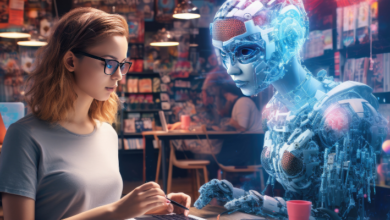How does AI affect digital agencies?

It is not necessary to mention that AI has become a powerful force in the digital marketing industry, transforming many industries.
Most digital agencies are embracing AI because they know its power to improve their service, as well as customer management. The McKinsey Global AI survey revealed some interesting insights. A 63 percent discountMany respondents have seen revenue increases, and attribute this to AI adoption within their own business units.
What’s even more is that high-performing companies find themselves nearly Three times as much Revenue gains of more than 10 percent are likely, highlighting the impact AI has on reshaping digital ecosystems.
In the same study, AI adoption by digital agencies resulted in a decrease of unit costs on average of at least 10%. So, it’s crystal clear that AI made great waves in digital marketing; both in positive and negative ways. Let’s discover them now.
Digital Marketing: Understanding AI’s Impact
AI has already transformed the way that we do marketing. It’s helping us to better understand our customers, create more relevant content and deliver more personalized experiences.
David Ogilvy, Chairman of Ogilvy & Mather
First thing first; let’s break down the importance of digital marketers understanding the impact of AI.
It is the talk of the town that AI enables marketers to achieve an unprecedented level of personalization by crafting customized content, product suggestions, and marketing communications for each customer, all based on their behaviors & previous preferences. Today, we know how important it is to master the AI-driven process of personalization.
But knowing all the details does not necessarily mean that we know how AI will impact digital marketing. AI has a lot to offer in terms of marketing. AI’s power in data management and automation is increasing day-by-day. AI can now handle a wide range of tasks including data crunching (A/B testing), audience categorization and automated data analysis. This also allows marketers to spend more time on creative thinking and strategy.
What’s more, through AI-powered analytics, digital marketers gain the ability to predict customer actions plus trends, which empowers them to establish decisions on data-driven insights and adapt strategies.
AI has a significant impact on the marketing world, which will only grow over time. To stay competitive, digital marketers and digital agencies need to know how AI functions. Other words, those who have an understanding of AI are better equipped to adapt and succeed as the marketing landscape changes rapidly.
Let’s go on by focusing on more specific areas.
Artificial Intelligence: The Future of Digital Marketing
AI is the future marketing. It’s the only way to scale and personalize marketing at the same time.
Scott Brinker is the co-founder and CEO of ChiefMartec
As we mentioned before, AI & AI-powered tools and platforms are being used to automate some marketing tasks, personalize customer experiences, and make better decisions at every stage of the sales funnel nowadays. As you know, the modern approach to marketing is based on using high-tech devices and tools. This includes ways like social media marketing, search engine optimization, PPC, email marketing, and more – not relying on print ads, TV commercials, and so on.

At this point, it is possible to say that, AI and related tools, platforms, and tech-driven efforts create the thing we call “modern marketing,” which is totally focusing on customers and specific needs & desires. Digital marketers today are committed to meeting and understanding the needs of their customers. This is different from older colleagues who embraced a product-centric strategy. This kind of approach can be achieved with the help of marketing tech, and of course artificial intelligence.
Once again: It’s no secret that modern marketing has been transformed by AI. AI provides data-driven insights that allow marketers to tailor experiences to each individual customer, based on his or her unique interests and preferences.
What are the main technologies that have transformed digital marketing? Continue reading.
Key AI Technologies Transforming Digital Marketing
AI will be the biggest wave of digital marketing. It’s going to change the way we do everything from targeting and segmentation to content creation and campaign optimization.”
Brian Solis is a Principal Analyst with Altimeter Group
It’s no secret that digital marketing is going through a massive transformation. Some key technologies are at the forefront of this change.
As we previously mentioned, one of the most notable actors in this transformation is AI – which is reshaping marketing strategies by automating various tasks, enabling more personalized CX, and boosting data-driven decision-making.
AI, for example, is employed to provide personalized content and real-time campaign optimization. It can also be utilized in providing client service. A practical illustration of this is Netflix, which employs AI to analyze viewers’ choices and suggest custom/similar content, leading to greater user & customer engagement and the rapid growth of its platform. Amazon uses AI to deliver personalized product recommendations and analyze data from customers, leading to higher sales and conversion rates.

Machine Learning, a.k.a ML, is another “game-changer” in the digital marketing industry. Machine learning, as digital marketers are already aware, allows computers to make predictions and give recommendations, without any direct programming. Machine learning is revolutionizing digital marketing. It has enabled personalized content, marketing task automation, and customer behavior predictions.
Spotify provides a real-world case study of how AI and ML can be used together to analyse customer/user behavior. It uses machine-learning technology to examine user listening habits, create personalized playlists, and enhance the CX.
Another key tech is Natural Language Processing (NLP), which allows computers to understand & process human language. NLP is a powerful tool for digital marketing. It can be used to generate content and improve SEO.
These technologies actually answer the question of why artificial intelligence matters in the digital world; however, we’ll deep dive into that topic. Continue reading.
Why is AI important in Digital Marketing?
AI helps us better understand customers’ needs. The result is more efficient marketing campaigns, and a better ROI.
Rand Fishkin co-founder Moz
The value of artificial intelligent in the digital marketing world is undeniable and has many facets, as evidenced by the numerous convincing arguments. It streamlines tasks and saves time by automating repetitive and routine duties. This allows marketers to focus on more creative and strategic endeavors.
Moreover, it’s worth noting that AI equips promoters with the ability to curate deeply tailored strategies by comprehending their potential clients and amassing relevant data, thereby unearthing customer inclinations and necessities.
Artificial intelligence can also help us understand the habits of consumers by analysing massive quantities of data, such as browsing records online, purchasing trends and interactions with social media platforms. By leveraging these insights, companies can refine their promotional strategies to foster a more satisfying customer journey while increasing the return on investments. AI allows businesses to fine-tune their marketing strategy and ensure they achieve the best results.
Artificial intelligence is a powerful tool for identifying and targeting the correct audiences, posting and scheduling content, as well as analyzing performance.
AI’s Impact on Digital Marketing Agencies
AI has a major impact on the digital marketing industry, both in terms of how they work and the services that they provide.
Mark Ritson, Professor of Marketing at London Business School
Digital Marketing Agencies Can Benefit from AI Adoption
It’s time to explore some more advantages tailored to digital marketing agencies, where AI is the shining star.
AI’s entrance into digital marketing offers agencies a wealth of services to provide their clients. These include personalized content and automated campaigns.
Besides, AI isn’t just a backstage act; it’s also centered on boosting client satisfaction. With AI at their disposal, digital agencies are now able to deliver exceptional results. The marketing campaigns can be more targeted, resulting in higher conversion rates and a better ROI.
AI can also be a powerful tool for modern agencies, allowing them to improve their performance and remain competitive. It’s like having a trusty sidekick that automates tasks, cuts down costs, and amps up productivity, making sure agencies deliver their services with top-notch efficiency.
AI continues to develop, so the digital marketing industry can expect to be flooded with new ways to leverage its potential. This will push AI campaigns into exciting and innovative territories.
Digital Marketing Agency AI: Challenges and considerations
We have actually outlined the positive impact of AI & related techs on the digital marketing industry, particularly in areas where the human touch is vital. We will therefore now address the negative or potential aspects of AI as seen by digital agencies.
But, as we delve into the potential “dark side” of AI, looking through the lens of digital agencies, we uncover a few wrinkles. The first is that AI could threaten to displace jobs. AI’s growing smarts mean it can now muscle into territory previously ruled by human marketers, potentially causing a reshuffling of the workforce in the digital world.
Ethics is another issue; as AI’s power to create super-personalized marketing campaigns teeters on the edge of manipulating consumers. It’s also got a talent for collecting consumer data without them even realizing it, ringing alarm bells for privacy and transparency in the marketing arena.
And last but not least, there’s the issue of bias. AI algorithms can unwittingly memorialize biases lurking in the data they’ve been fed, and it can lead to one-sided treatment in digital marketing efforts.
The key is to strike a balance between AI’s potential and its ethical and workforce implications. To deal with these curveballs, digital marketing agencies should keep the training wheels on for their staff, making sure they’re well-equipped with the skills. It’s also a good call to savvy needed to master AI while keeping that human touch and the ethical compass intact.
AI Real-World Applications in Digital Marketing
AI allows us to automate repetitive digital marketing tasks, allowing more time for strategic and creative projects.
Jenny Campbell is the CMO of Salesforce Pardot
Let’s explore AI use cases in the real world together.
Uber – AI for CX
Uber has been a leader in AI-based digital marketing. Uber uses AI for a variety of purposes, such as personalizing customer experience, improving ad targetting, automating processes, and getting insights about customer behavior.
By using AI effectively, Uber offers recommendations for rides, restaurants, and other services by analyzing users’ location, travel history, preferences, and other factors. The “Predictive Demand” campaign is a standout example of Uber’s AI-driven, comprehensive approach, aimed at forecasting customer demand for rides while optimizing the driver fleet. In order to predict ride requests, Uber analyzed recorded ride data as well as weather conditions and other factors. It was then able allocate more drivers efficiently in response to customer demands.
Domino’s – AI for Advertising on Social Media
Another brand taking full advantage of AI is the well-known Domino’s; the brand creates the targeting of its social media ads but also sustains an ongoing process of fine-tuning & optimization. This process requires diving into an ocean of data to uncover patterns and trends.
In the first stage, the brand positioned itself as an allie of users on social media by asking humorous questions or inviting people to express their opinions about food.
The insights unearthed from that data analysis serve as the cornerstone upon which Domino’s builds its social media marketing strategies. AI helps the brand to fine-tune its marketing strategies and reach out to more people with its ads on social media.
H
Yet, it doesn’t stop there. Domino’s takes the extra step of optimizing ad placement, ensuring that their mouthwatering pizza offers are right where their customers are most likely to see them and the brand does not hesitate to keep its advertising endeavors fresh, useful, and relevant all the time.
Procter & Gamble (P&G) – AI for Spesific Solutions
Commonly known as P&G, Procter & Gamble has integrated AI into its entire marketing strategy, reflecting its commitment to delivering personalized and effective campaigns. The brand’s first ace up its sleeve is the use of AI to produce personalized video ads for its products in addition to filtering through customer data, identifying the specific types of video ads that have the highest likelihood of resonating with each customer.
P&G’s targeted approach isn’t just about casting a wide net; it’s about precision, delivering video content that speaks directly to the customer.
By utilizing AI, the company can identify the most receptive audiences for each product/service, considering factors – demographics, interests, and online behavior. That means the brand’s ads find their way to the screens of the prospects most likely to convert into customers.
But it doesn’t stop at the launch; P&G trusts AI to measure the effects of their marketing campaigns. P&G tracks the behavior of buyers across devices and channels, creating a full picture about how well their marketing campaigns are doing. It’s about making informed decisions while achieving results backed by robust data insights.
Click here to read the article in full You can read more about it here







